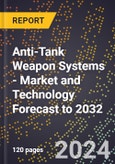The ongoing war in Ukraine continues to impact the defence market and be a key driver for the anti-tank weapons segment. The success they had during the first period of the war made them popular to the point that some considered whether that was the end of the armoured platforms era. However, that would only distort the reality. Anti-tank weapons are indeed a powerful weapon system against armoured targets, buildings and other targets.
They extend ground troops’ lethality to long-ranges and with high accuracy, and that is the reason there is an effort to bring such improved capabilities at the squad and platoon levels. That nevertheless comes at the cost of increased weight which hinders mobility. That is something that unmanned ground and air systems address and in conjunction with technological enablers such as AI.
Anti-tank weapon systems, especially ATGMs address some of the requirements for long-range fires on the battalion level but they are facing strong competition from the loitering munition, which provides an affordable combination of long-ranges, ISR, and advanced engagement tactics.
Due to the war in Ukraine, the anti-tank weapon systems industry faces significant challenges, which are only exacerbated if we add anti-tank ammunition and missiles into the equation. Supply chains and production lines are trying to meet the demand for those items, but they have only just started picking up pace. That is, however, one part of the problem, as making this sustainable requires the industries to make investments and the countries (the buyers) to set up a long-run procurement plan. The anti-tank weapon systems market offers significant opportunities for sales and opportunities for collaborative schemes between the industrial stakeholders, that this report highlights.
Covered in This Study
- Overview: Snapshot of the anti-tank weapon systems technology in the military market during 2024-2032, including highlights of the demand drivers, trends, and challenges. It also provides a snapshot of the spending with respect to regions as well as segments and sheds light on the emergence of new technologies.
- Market Dynamics: Insights into the technological developments in the anti-tank weapons market and a detailed analysis of the changing preferences of governments around the world. It also analyses changing industry structure trends and the challenges faced by the industry participants.
- Segment Analysis: Insights into the various systems market from a segmental perspective and a detailed analysis of factors influencing the market for each segment.
- Regional Review: Insights into modernization patterns and budgetary allocation for top countries within a region.
- Regional Analysis: Insights into the systems market from a regional perspective and a detailed analysis of factors influencing the market for each region.
- Impact Analysis: Analysis of how certain events will impact the anti-tank weapon systems market. This will give you an indication of which factors are important for the forecast.
- Key Program Analysis: Details of the top programs in each segment expected to be executed during the forecast period.
- Competitive landscape Analysis: Analysis of the competitive landscape of this industry. It provides an overview of key companies, together with insights such as key alliances, strategic initiatives, and a SWOT analysis.
Segmentation
The publisher has segmented the Anti-Tank Weapon Systems market in three groups:
Region
- North America
- Europe
- Asia Pacific (APAC)
- Middle East & Africa (ME&A)
- Rest of the World
Type
- ATGM ER
- ATGM SR
- ATGM MR
- ATGM NLOS
- A/T Ammunition
- A/T Rocket Launcher
Launch Method
- Shoulder-launched
- Ground-launched
- Vehicle platform-launched
Reasons to Buy
- A detailed insight of anti-tank weapon systems technologies.
- An insight on the efforts currently undertaken in the US, European, and EU-27 regions in terms of funding, regulatory and collaboration opportunities.
- Develop an understanding of the market’s demand drivers, industry trends, and the latest technological developments.
- Comparison of the anti-tank weapon systems versus loitering munition, what the advantages and disadvantages or limits of each system are.
- In-depth understanding of other factors affecting the market such as defence spending, operational requirements and challenges faced by manufacturers, among several others.
- Identify opportunities available in the market.
Table of Contents
Companies Mentioned
- Airbus Defence & Space
- Boeing
- China Aerospace Science and Industry Corporation
- DSTL – Defence and Science Technology Laboratory (UK)
- Instalaza SA
- Israel Aerospace Industries
- Leonardo
- Lockheed Martin
- MBDA
- Nexter
- Northrop Grumman Corporation
- Oy Forcit Ab
- Rafael Advanced Defence Systems
- Raytheon (RTX Corporation)
- Rheinmetall AG
- Roketsan
- Saab
- Saab AB
- TDW Gesellschaft fu¨r verteidigungstechnische Wirksysteme mbH
- Thales
- Totalfo¨rsvarets forskningsinstitut
- Woskowy Instytut Techniczny Uzbrojenia








